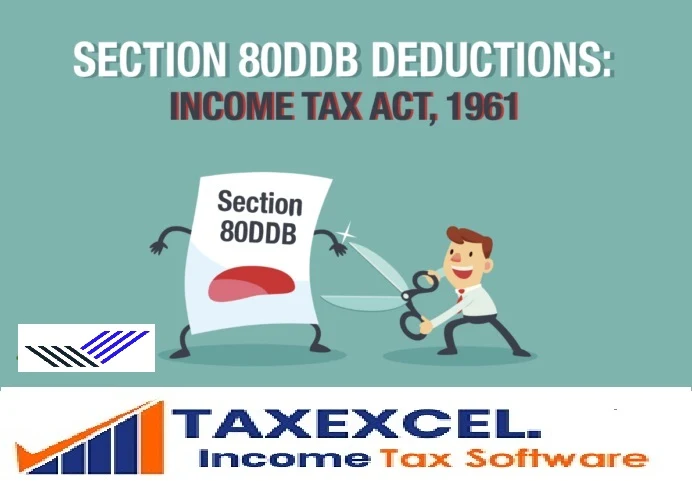Deduction U/s 80 DD and 80 DDB. A person with a disability
is a reduction in maintenance including dependence treatment [Section 80 DD]
(i) Eligible Assessor
These deductions for any person who is a resident of
The deduction will be allowed a fixed discount of
seventy-five thousand ((Rs. 5,000)) from his total income of the previous year.
(i) A deduction of Rs. 1,25,000 / - will be given to
such dependents where there is a severe disability.
(ii) Terms
(A) Deduction are allowed if
they are spent:
Expenses for medical treatment (including nursing)
and rehabilitation of a dependent, being a disabled person or a payee or any amount deposited under the schedule laid down by the Life Insurance Corporation
or any other insurer or UTI administrator Specific agencies.
(B) In the above-mentioned scheme, in case of death
of a person or a member of a Hindu undivided family, provision has been made to
pay an annual or single amount for the benefit of a dependent who is a disabled person whose name has been subscribed to this scheme.
(C) The assessor nominates a person with a
disability, a person with a disability or any other person or a trustee as a
trust for disbursement of money on his behalf for the benefit of the dependent.
(D) If the dependent is a person with a disability, a
member of the Hindu Undivided Family or a pre-determined amount equal to the
amount paid or deposited as before shall be deemed to be the income of the
previous assessor that this amount is received by the assessee in the year and
Will apply.
(E) A copy of the certificate issued by the medical
authority in the prescribed form and manner assessed by the assessor seeking
exemption under this section and in case of a refund of income under section 139,
the assessment shall send the exemption in the year.
The condition of persons with disabilities is that in
case of necessity to reassess the amount after the time prescribed in the
aforesaid certificate, any assessment relating to any previous year under this section will not be allowed after the expiration of the aforesaid certificate.
No new certificate is obtained unless determined and a copy is not
provided with the return of income.
Exclusion in Medical Treatment etc. (Section 80DDB)
(i) Eligible Assessor
This exemption is allowed to
any person or HUF who lives only in
(ii) Terms
(A) has actually paid any amount for the treatment of
any disease or illness mentioned in the regulations issued by the Evaluating
Board.
(B) In the case of an individual person conducting
the assessment, the cost shall be borne by himself or the dependent
(C) Expenditure for any member of any assessing Hindu
Undivided Family may be Hindu Undivided Family.
(d) "Dependent"
means:
In the case of any person,
spouse, children, parents, siblings or any one of them,
In the case of Hindu undivided families, Hindus are
members of undivided families.
Complete or essentially dependent on this national or
Hindu undivided family for its support and maintenance
Support and maintenance.
(iii) Discount rate for (a)
The amount spent by a ‘non-senior patient’ (under 60
years of age); Or 40,000 per year, which is less than the previous year, in the fact this amount was paid.
(B) a 'senior citizen' (age
60 years or more)
In the case of any member of the Hindu undivided the family who is actually assessing the amount paid or his dependents or valuers
and who is a senior citizen, a rebate of ড 100,000
will be allowed under this section.
"Senior Citizen" means an individual
resident in
(iv)Treatment of Medical Insurance Claims Received
The amount of exemption under this section should be reduced by the amount paid
for the treatment received by an insurer under insurance, or for the treatment
of a person provided by an employer.
(v) Duplicate copy of prescription [Option of First A provision in Section 80 DDB] Exemption under this section shall not be allowed
unless one receives a copy of the prescription for such treatment from an
evaluating neurologist, an oncologist, urologist, a haematologist, or an
immunologist. Any other specialist may be prescribed as such
(vi) Diseases granted u / s
80DDB [Rule 11DD]
Neurological diseases:
(A) Dementia
(B) Dystonia muscular
deformity
(C) Motor neurone disease
(d) Ataxia
(E)
(F) Hemiblimus
(G) Aphasia (h) Parkinson's
disease
Cancer
Fully acquired acquired
immuno-deficiency syndrome (AIDS)
Chronic renal failure
Hemophilia
Thalassemia.


